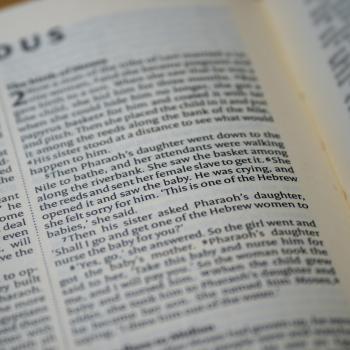
There is a somewhat shocking detail in the so-called ‘Hall of Fame of Faith’ in Hebrews chapter 11. In the midst of extolling the virtuous saints of the Old Testament who lived ‘by faith,’ like Moses and Abraham, we read the name ‘Samson.’
Wait, Samson from the book of Judges (there isn’t any other Samson in the Bible)? The same Samson who was best known for running after whores and caring more about pleasure than being faithful to his family and to the Lord? How did Samson get in the Hall of Fame of Faith? How was he righteous?
In the new movie Samson, produced by Pure Flix, the same studio that made The Book of Esther, The Book of Ruth, The Book of Daniel, The Case for Christ, A Christmas Angel, and God’s Not Dead, Samson (Taylor James) is more heroic (and chaste) than sinful. The film begins with an invented scene, intended to introduce characterization, where Samson and his brother Caleb are stealing food from the Philistine oppressors who have been stealing it from the Israelites. The scene is telling as it depicts Samson as a guy who is a little like Disney’s Aladdin, a pluckish young man who bends the rules, but only because his enemies sort of force him in to it.
The movie picks up Samson’s story in Judges 14 when he falls in love with a Philistine woman (not given a name in Scripture, but named Taren in the movie) and marries her, despite the protests of his parents. Many of the details of Samson’s story are included in the film, and I was impressed by not only the good production values (sometimes lacking in Christians movies), but also how helpful it was in visualizing the situation in the time of the judges, particularly in the relationship between the Philistines and Israel.
The movie certainly takes artistic liberty, the biggest one being adding two Philistine rulers, a father (Billy Zane) and son (Jackson Rathbone), who are essential to the plot. Now, I understand artistic liberty and I even appreciate in many movies. I understand that there are times when you have to add some characters and dialogue in order to turn a story from literature, even from sacred Scripture, into a well-paced, three act movie. However, there was one detail of Samson (the movie) that I think changed the whole theme of the Samson story in the Bible. In the movie, Samson is shown praying at multiple times and wrestling with God’s will and silence throughout. However, in the biblical account, there is no sense that Samson cares about God at all, and he never utters a prayer or does anything intentionally righteous until the very end of his life, when he prays for God to remember him and give him strength to destroy the house of the Philistines (Judges 16:28-30).
The Reformation Study Bible has a wonderful synopsis of Samson’s story: “[O]f all the judges, Samson was most clearly a rogue. Having taken the vow to be a Nazirite, he kept only the part about not cutting his hair. He repeatedly broke God’s covenant and his vow by seeking foreign wives, sleeping with prostitutes, touching dead things, and drinking wine. He showed no interest in delivering Israel. The fanfare of his calling and the circumstances surrounding his birth and life only heighten the tragedy of his life and emphasize the depths to which Israel had descended.”
The film’s sympathetic characterization of Samson seems to come from a sincere desire to reconcile the Judges account with Samson’s place in Hebrews 11. However, it falls in to the old mistake of seeing Old Testament characters as simply moral examples, to either follow or learn from. As Tim Keller writes, “There is, in the end, only two ways to read the Bible: is it basically about me or basically about Jesus? In other words, is it basically about what I must do, or basically about what he has done? If I read David and Goliath as basically giving me an example, then the story is really about me. I must summon up the faith and courage to fight the giants in my life. But if I read David and Goliath as basically showing me salvation through Jesus [we are the overmatched Israelites, Goliath is Satan, and David is Christ], then the story is really about him.”
The shocking part of Samson’s story is not that God answered his prayer to give him strength to destroy Israel’s enemies, since we’re told early on in Samson’s stories, in Judges 14:4, that Samson’s dalliances with Philistine women was “from the Lord, for he was seeking an opportunity against the Philistines.” Rather, the shocking part of Samson’s story is that he is included in a chapter of people who lived by faith.
So, how was Samson righteous? How did he live ‘by faith’? His story is ultimately a story of someone saved by grace through faith alone by the radical, undeserved grace of God. Most of Samson’s life showed him to be the opposite of someone living by faith, but in the end, like the criminal on the cross, God justified him and gave him faith, thus destroying the enemies of God and bringing Israel closer to the glorious reign of their first king (David) and their ultimate king (Jesus). As the Reformation Study Bible comments, “Samson was not like Gideon or Samuel [other judges]. Though the Spirit came upon him repeatedly, this had no impact on his character… Yet the account of the end of his life reflects a renewal of his faith while a prisoner of his (and God’s) enemies. Heb. 11:32 lists Samson on the honor roll of faith.”
Samson’s story is the story of the marvelous grace of God to the most undeserving of sinners. There is no one who is righteous, in and of himself, only those made righteous by the regeneration of the Spirit imputing the righteousness of Christ. The new film Samson sort of gets this (and even seems to visually link Samson’s sufferings with Jesus’ sufferings), but ultimately it is too concerned with presently a sanitized version of a flawed but likable Samson to get at the radical nature of grace.













